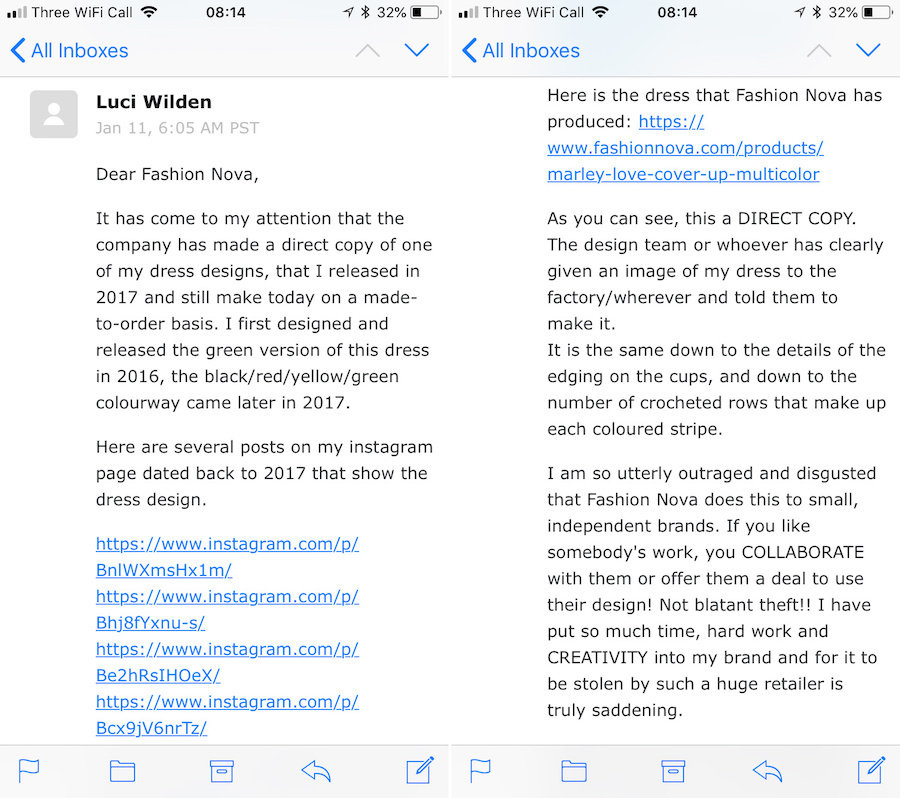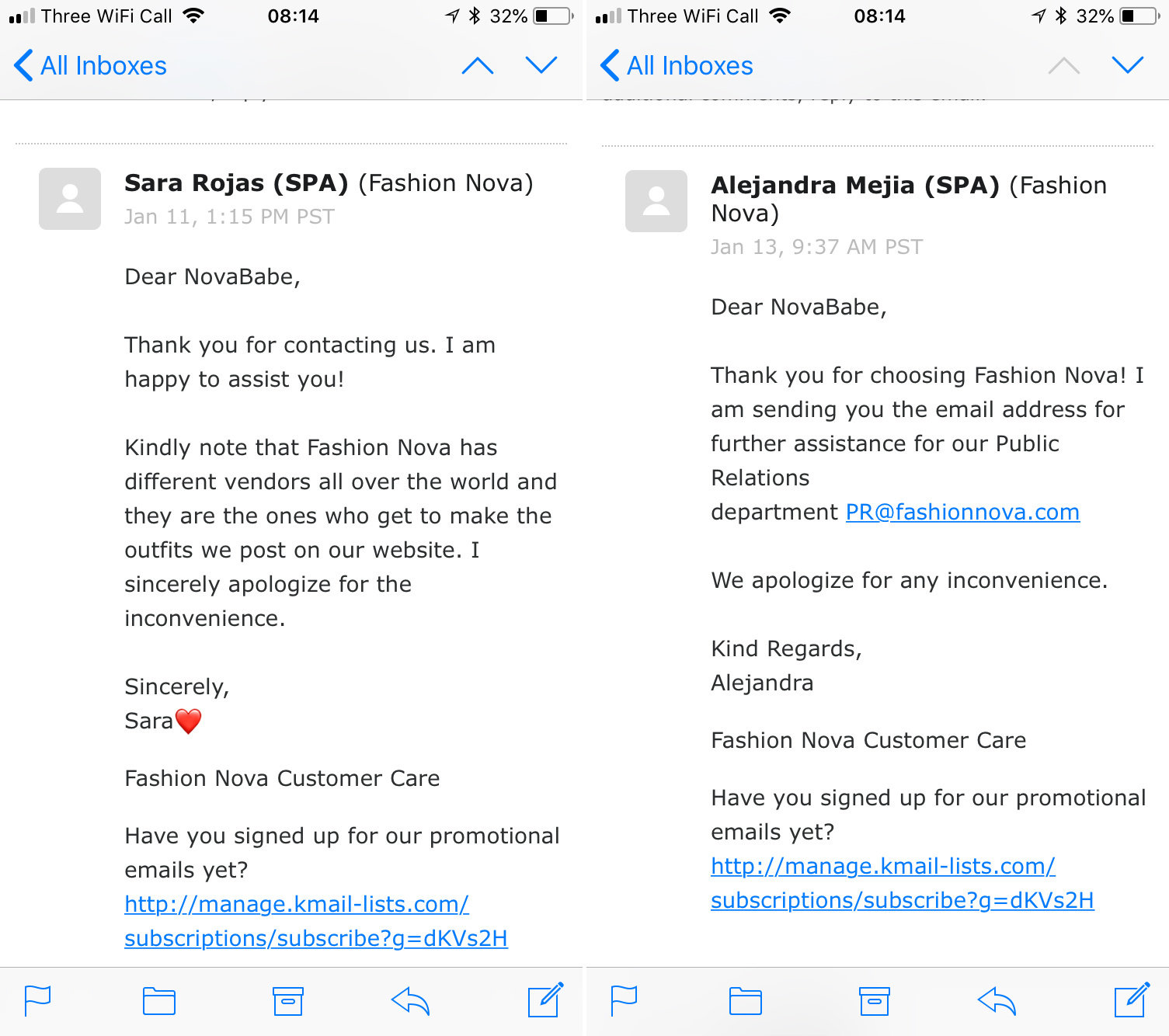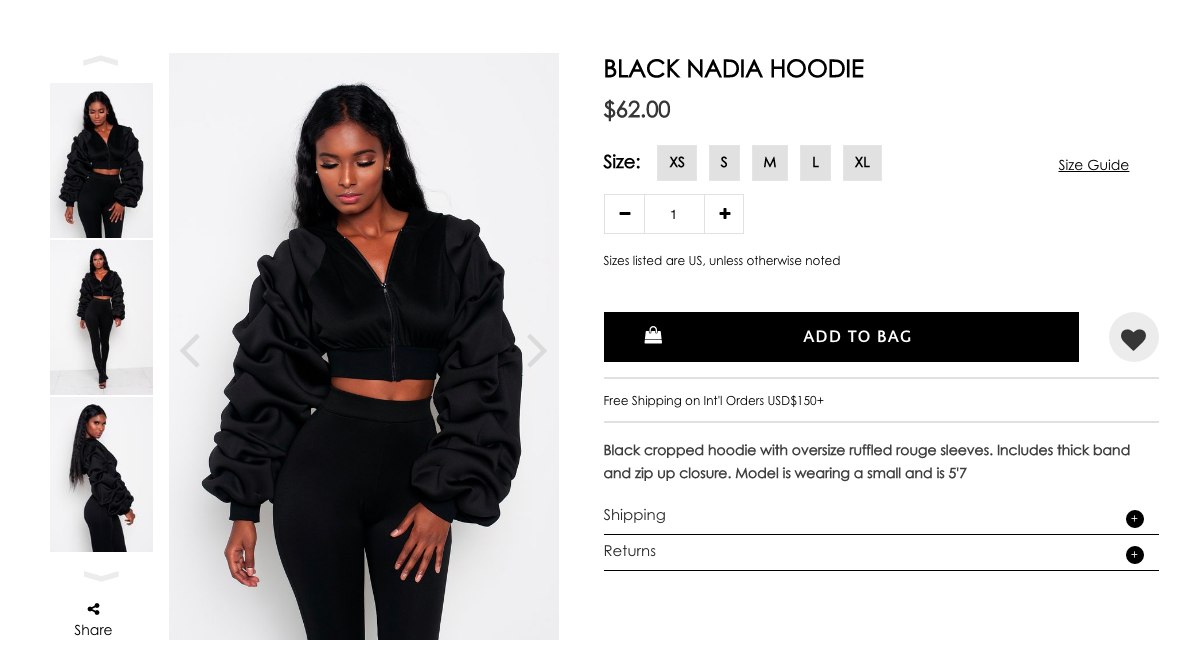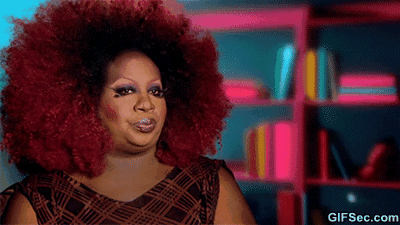Fashion Nova has ruled the fast-fashion business with double-take prices, massive inventory, and most important, relationships with nearly every influencer and celebrity you can rattle off. The brand was the most searched fashion term on Google in 2018. The industry, in general, cannot help but be intrigued by what seems to be a foolproof marketing strategy that pretty much lives and dies by pushing clothes into our faces 24/7 on Instagram. (Admit it. You "added to cart" at least once or thrice.)
Yet at its core, is Fashion Nova more harmful than helpful to the culture? The brand has been called out for colorism and size-exclusion on its social media platforms by influencer Jackie Aina, but there seems to be another problematic layer to its operations.
Indie designers — most of whom are black — have been repeatedly calling out the brand for allegedly intentionally selling knockoffs of their designs. They also claim the brand has dismissed them when they've reached out, sometimes blocking them on social media altogether.
Kim Kardashian famously called out Fashion Nova via social media for knocking off the designer exclusives she wears, and as usual the world paid attention.
She accused the brand of not only knocking off her threads but also purporting to have a business relationship with her and threatening her real relationships with high-end designers. Fashion Nova swiftly apologized and confirmed there is no relationship, although the brand moved forward with selling knockoffs on its site.
Critics, fans, and media — the loudest of them all, likely Diet Prada — continued speculating whether or not Kim Kardashian and Fashion Nova are involved in a secret relationship despite their public fallout. We may never know if they're actually sitting at the table together, but what is clear is that the media cared. Kardashian pushed the conversation about the lackadaisical copyright laws to the forefront of fashion industry chatter for at least a solid week.
But what about these indie designers who seemingly sustain knockoff culture's hardest blows?
Luci Wilden, a crochet artist and founder of the Knots & Vibes brand, was shocked to discover Fashion Nova selling its own iteration of her dress that was exactly the same — down to the "number of rows in the stripes."
Wilden spotted the copy in January 2019, but she has no idea when the item first went up on the Fashion Nova website or how long it was available.
"Didn’t even want to post this on my feed cause it looks ugly but I’m so mad @fashionnova have ripped off my Skin Out Dress ($124, Knots & Vibes) DETAIL FOR DETAIL," she wrote on Instagram.
Wilden reached out to Fashion Nova about the matter and provided Revelist with screenshots of the email exchange.

"I am so utterly outraged and disgusted that Fashion does this to small independent brands," part of Wilden's email to Fashion Nova reads. "If you like somebody's work, you COLLABORATE with them or offer them a deal to use their design! Not blatant theft!! I put so much time, hard work and CREATIVITY into my brand and for it to be stolen by such a huge retailer is truly saddening."
Fashion Nova responded to Wilden and noted the copy was likely made by wholesale vendors it buys the clothes from.

"Dear NovaBabe," begins the response from Fashion Nova Customer Care Representative Sara. "Thank you for contacting us. I am happy to assist you! Kindly note that Fashion Nova has different vendors all over the world and they are the ones who get to make the outfits we post on our website. I sincerely apologize for the inconvenience."
The brand's next email to Wilden directed her to its public relations department. According to Wilden, she did reach out to the PR department and never received a response.
"I also submitted a complaint to their website host, Shopify, to have the page taken down, which it was," she told Revelist. "In those cases, Fashion Nova [has] the right to appeal, but since the product was already sold out, I think they didn't bother."
Note that Fashion Nova shifting blame to its vendors does not 100% align with how it explained away rumors that it works with Kim Kardashian.
Fashion Nova admitted to purposefully knocking off Kim Kardashian's clothes and even provided information about how it creates copies so quickly by stating that it's “capable of executing designs within hours." This statement concerning the Kim K fiasco proves that Fashion Nova's role in the knockoff process isn't always reduced to blind purchases from "vendors," as the brand rep told Wilden.
As far as Wilden knows, Fashion Nova has not sold any other imitations of her brand. She said she even noticed an uptick in sales after she blasted the retailer on Instagram. Unfortunately, other indie designers have not been so lucky.
Destiney Bleu, owner of d.bleu.dazzled, told Revelist that her brand has gone down by almost $100K over the past few years due to Fashion Nova and subsequently other indie boutiques copying her signature crystal-encrusted Midnight Sky Tights ($75, D.bleu.dazzled), once worn by Kylie Jenner.
Bleu is a dancer-turned-entrepreneur with a clothing brand that creates bedazzled bodysuits, tights, and performance outfits inspired by the dance community. Every crystal on her shimmery designs is applied by hand, by the way. She has created outfits for celebrities such as Beyoncé, Mariah Carey, Lady Gaga, and Shania Twain. Her work has also been featured on television series such as Empire and Star.
Kylie Jenner posted this photo on her Instagram of herself wearing Bleu's tights. Fashion Nova subsequently used the photo to sell its own cheaper version.
Bleu's issue with the photo is that using an image of Jenner wearing her tights to sell Fashion Nova's clothes creates obvious brand confusion. How does an indie designer solidify herself as a profitable brand when photos of her actual designs are used as Fashion Nova's marketing? The brand has since deleted the image of Jenner wearing the tights. However, you'll also find that Fashion Nova still sells a $12 version of Bleu's suspender Meteor Fishnets ($125, D.bleu.dazzled).
"I will never say I invented certain things, because I know that certain crystallized hosiery existed before," she explained to Revelist. "But the method and the way I’m doing it, and the amount of crystals [that I use], didn’t exist before because I would have f****** bought it before. I know what methods I started, so it’s easy to see what of mine they are being influenced by."
Since then, Fashion Nova has sold multiple d.bleu.dazzled imitations, according to Bleu.
"It would be in your best interest to not @ me in Fashion Nova’s defense or telling me 'this is what happens in fashion,'" she tweeted out to people who criticize her for calling out the knockoffs. "I will immediately block you. They’ve copied me and every single designer friend of mine and oversaturated the market with a cheap knock off."
Bleu believes that Fashion Nova, in its current position, could be successful without dupes if the brand chose to ditch them entirely.
"I understand them wanting to make things affordable, but there’s something to be said about making money off of other people’s designs," Bleu told Revelist. "I don’t really follow them, but I know they have like 100 styles or something new every week, [so] their constant copying is greed. It’s not that they are just trying to provide affordable things. They are being greedy because they are promoting overconsumption."
Like Wilden of Knots & Vibes, Bleu believes that a more ethical practice would be for larger brands to collaborate with the indie designers from whom they draw inspiration.
"It’s obvious that they don’t respect the creative process. If they did, they would collaborate with designers. They’ve been around a few years and they have yet to collaborate with anyone," Bleu said. "I feel like if they would, they could pay a designer fee and they would make their money back in an hour or two. Then they would have their usual shoppers, the designer’s fans, and anyone who wanted that designer’s stuff and couldn’t afford it. I think they could shift the entire narrative by collaborating and probably do even better."
Bleu emphasized that at this point, Fashion Nova has been so disrespectful to the indie designer community, and to her brand personally, that she would never work with the fast-fashion retailer. However, she does suggest that Fashion Nova seek collaboration with other indie designers.
Another indie designer who has been vocal about Fashion Nova ripping off her designs is Jai Nice, the boutique owner and designer of Kloset Envy.
Jai Nice built her Kloset Envy boutique from the ground up by moving to LA and writing a business plan at age 18, according to an interview with Rolling Out magazine. The brand is now a booming online business, and its Instagram page has over 700K followers.
Nice called out Fashion Nova in 2018 for buying her Black Nadia hoodie, making a copy of the hoodie for the Fashion Nova x Cassie Collection, and then returning it back to her warehouse.
"Stop stealing from the African American community @fashionnova," she wrote on Instagram. "Richard, IDGAF how much y'all paying ppl to promo y’all cheap a** sh**. Did you forget y’all just had one of the managers buy from @klosetenvy under another name just to get the sample to remake it."
"Y’all [too] cheap to add the hood on it SMFH. Then y’all got sloppy and returned it back from the shipping department SMFH. The f****** nerve to buy and return," she continued.

"I’m not refunding sh**. I’m sending it right back to y’all. Since y’all wanna play I’m gonna Post y’all [employee's] whole name and address y’all bought it under. Since y’all think it’s cool y’all wanna keep playing with ppl. This ain’t the first or the last time that he think [it's cool] to keep f****** with the community. They ain’t for Cassie Collection I have proof you bought 2 of the same exact items just to see how it was made. Payola @fashionnova culture vulture. I let you have my model wtf else do you want get off my d*** I’m sick of y’all."
Nice even had to defend herself against Fashion Nova fans who accused her of lying about designing the jacket and having her original design returned by Fashion Nova.
"Don’t come talking no shit OK. This was designed last October before anyone had it. No one started making this hoodie until I released it. Let’s get that straight. This took four samples to get it right the perfect fit and to make sure the sleeve stay[s] puffy," Nice shared on Instagram.
"Like I said, @FashionNOva it would [have] been cool if you ain’t send ya employees to buy it then personal send it back from ya’ll shipping department but I guess ya’ll got sloppy. Fashion Nova you make enough money you culture vulture. You need to stop before I start dropping real tea [about] how you telling manufacturers to not work with certain companies because you don’t like them and how [they] want [to] put other companies outta business. Stop f****** with the black community. You ain’t gonna keep getting away with this shit. I’m not gonna even knock the ppl that’s promoting them cuz that’s where most of [their] money coming from is fashion nova Post. Without them posts a lot of people… let me hush."
According to Jai Nice, Fashion Nova responded to her allegations by blocking her on Instagram. Months later, this happened.
Yes. Fashion Nova started selling another design that looks mysteriously similar to a dress Jai Nice designed for Kloset Envy.
"Alexa play Mariah Carey why you so obsessed with me. Y’all just going to keep it going huh? I really be trying to ignore this and looks past it. But honestly it’s getting ridiculous. Why do y’all continue to steal / rip off designers?" Nice asked on Instagram. "Is this the new thing or something? Just because y’all paying the culture to promote y’all doesn’t make this sh** right smh."
To answer Nice's question: Copycat designs sadly aren't a "new thing" at all. Unfortunately, most aren't even illegal.

CC: Diet Prada. And word to the infamous Canal Street in New York City where knockoff designer goods are openly sold on sidewalks in front of the police on a daily basis unless it's raining. Fashion Nova is just the new gentrifier on the block, but before it, fast-fashion brands like Forever 21, H&M, Primark, and Zara have all been (and are still regularly) accused and sued for theft of apparel designs. Among the most recent: Vans filed a lawsuit against Primark for selling a shoe that looks almost exactly like the brand's iconic skateboard sneaker with its signature single stripe.
If you're a former fashion student like me, then this is cold tea — but if you're not, then get a cup out. There are few laws that protect designers from having their creations ripped off.
The U.S. Copyright Office does not allow copyrights for any designs considered to be "functional." The catch? Nearly all clothing is considered functional by the office. Womp.
The strongest defense designers have is to get a trademark for an aspect of the design to avoid brand confusion, which isn't the easiest thing to do. You can't trademark an entire article of clothing, but you can trademark one defining detail that is not functional.
A popular example is the red sole of the Christian Louboutin pump, which is trademarked so that no other designer can legally sell shoes with red soles. Designers can also apply for a trade dress, or protection for a specific packaging style (like the curved red carton of the McDonald's fries or the curvy Coca-Cola bottle, which still gets knocked off by the way). This isn't always helpful because obviously, most clothes aren't even sold with packaging.
Even with those protections in place, going to court is still very costly, especially for indie designers.
Indie designers often do not have huge budgets and expensive lawyers like the massive retailers do that they would be going up against. Because the legal protection territory is so narrow, this is how other brands are able to boldly and repeatedly copy fashion items with no threat of a legal clapback.
Because fashion designers are so unprotected, Briana Wilson, who founded the Matte Brand, has all but given up on preventing her designs from being ripped off and sold by Fashion Nova, PrettyLittleThing, or any other popular "Instagram boutique."
You may recognize the Matte Brand as the clothing company responsible for those sexy neon catsuits that won summer 2018. Teyana Taylor wore one to Coachella. Amber Rose ordered a custom fit of the same design. Influencer and swimwear designer Draya Michele also slipped into one. That bright catsuit helped spike the neon resurgence that fashion girls are still sporting today.
Per usual, it was imitated left and right. Wilson told Revelist she noticed that PrettyLittleThing ripped off the jumpsuit first for its collection with model and influencer Nazanin Mandi. Fashion Nova followed soon after with a similar set called the Neon Lace Glow, which is still available for $45.
"I feel like anything I put out, they’re going to rip off… At this point, I’ve been doing this for five years. I expect it," Wilson said to Revelist. "I just try to work my way around it but I expect for them to do these kinds of things.”
But that doesn't mean Wilson refrains from calling Fashion Nova out for selling copycats of her creations.
"I’m usually silent about this but *yawn* another day of @fashionnova ain’t sh**!!!!!!!! First off, this sh** looks trash," Wilson shared on her Instagram page. "I put so much quality time, money, tears [and] WORK into what I do & this has happened to me over and over again with almost EVERY major fashion business since I started. Thank you to everyone that supports me 🙂 @fashionnova s*** my d***. I rather shop @ the alley or SLAUSON."
"I think they’re kind of bold at this point with what they do," Wilson told Revelist. "I feel more like I’m paying their bills. I’m the one with the ideas. I’m keeping their brand going."
Wilson confirmed that she hasn't taken legal action because she knows the fashion industry isn't really set up for her to have a successful case.
"If there was a way to legally battle this, then I would 100% legally battle it," she said. "But because I’ve kind of already been through that process of being super mad, trying to find a way to solve it, and just coming up empty-handed, I’ve decided that it’s out of my control and that I don’t want to put that much energy into it."
Although the laws may not be in place (because they're antiquated AF), there is something so unsettling about a larger brand being able to take from indie brands that have less money and subsequently less power. It also says A LOT when the majority of indie designers getting knocked off are women of color.

There are certainly non-black designers who have addressed repeated knockoff issues with various brands, but it must be pointed out that the majority of the people who claim that Fashion Nova allegedly profits off of their creativity and hard work happen to be black women — even as Fashion Nova laces the pockets of thousands of influencers, many of whom are people of color.
Even though Fashion Nova aligns itself with names such as Cardi B (an Afro-Latina) and pays to have its brand name-dropped in rap songs and on the very black blog The Shaderoom, the brand is still slighting black women and then ignoring them (as with Briana Wilson and Destiney Bleu), dismissing them (as with Luci Wilden), and sometimes even blocking them (as with Jai Nice) when they stand up for themselves.
When Kim Kardashian called out fast-fashion brands for knocking off her designer clothes and threatening her precious relationships in the industry, Fashion Nova quickly fell on its sword with a public statement addressing the matter — and media outlets ate it up. For years indie designers have repeatedly claimed that this practice happens to them regularly and (for some) can affect their livelihoods and their ability to catapult their businesses forward.
Does "well, that's just fashion" truly have to be where the conversation ends? Perhaps legal precedents, higher accountability, and integrity are what Fashion Nova and really the entire fashion retail industry should consider "adding to cart."




